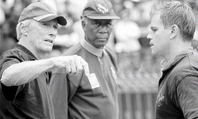Eastwood, Freeman back in saddle for 'Invictus'
Published: Sunday | December 13, 2009

Director Clint Eastwood (left) with Morgan Freeman (centre) and Matt Damon on the set of 'Invictus'. - Contributed
LOS ANGELES (AP):
Nelson Mandela made clear that Morgan Freeman was the man he would want to play him in a film.
When it came time to play Mandela in Invictus, Freeman told producing partner Lori McCreary that he had two men in mind to direct the film, which dramatises Mandela's partnership with a South African rugby star (played by Matt Damon) to rally their post-apartheid countrymen behind the team's underdog quest for the 1995 World Cup.
"I said, 'I can only think of two. Clint Eastwood, and then there's Clint Eastwood.' He's the best director I know," Freeman says of the filmmaker who gave him a plum role in Unforgiven and an Academy Award-winning part in Million Dollar Baby.
Freeman's comment comes moments before Eastwood enters the room for a joint interview, amiable banter and wisecracks ensuing as the two long-time friends and colleagues talk about their third collaboration.
"Are you supposed to be here?" Freeman demands of Eastwood.
going for he best
Informed of the compliment Freeman had just paid him as his only choice to direct Invictus, Eastwood shoots back: "That's very kind of him. He's obviously a man of very good taste and selectivity in life."
Freeman follows with a reminder that Eastwood had once "stood up in public with a microphone and called me the best actor in the world".
The exchange continues:
Eastwood: "That was right after I told Matt that he was the best actor in the world."
Freeman: "Doesn't matter. ... You always go for the best."
Eastwood: "I do pride myself on that. I believe in surrounding myself with the very best people, and that cuts down the margin for error, and that covers my inadequacies."
Freeman: "And he says, he can stand back and let them do their thing, then take all the credit."
Their give-and-take reflects the camaraderie that Eastwood, 79, and Freeman, 72, captured on screen as hired mercenaries in 1992's western Unforgiven and as ringside pals in 2004's boxing drama Million Dollar Baby. Both films dominated the Oscars, their wins including best picture and director for Eastwood.
expansive life
With both movies, Eastwood came calling for Freeman. With Invictus, Freeman was the first man on board, sending the script Eastwood's way, hoping his friend would want to direct.
Freeman had been meeting with Mandela since the 1990s with the idea of adapting the jailed-activist-turned-president's memoir Long Walk to Freedom for the big-screen. The actor eventually set it aside, finding Mandela's life story too expansive to fit into a film.
"How can you take all that and put it into a movie?" Freeman says. "Even if you condensed it down to a three-hour movie, how could you do it justice?"
Then journalist John Carlin told Freeman about his book, Playing the Enemy: Nelson Mandela and the Game That Made a Nation, recounting the new South African president's cheerleading that united whites and blacks behind the national rugby team.
The effort defined the healing spirit Mandela brought to the nation, Freeman says.
But Invictus is not being embraced by all South Africans, who complain that South Africans should be starring in movies about their own stories rather than American actors. South Africans do, however, have key roles in the film, including Patrick Mofokeng as Mandela's chief bodyguard.
Eastwood sees a lot of similarities between Mandela and Freeman.
"I've always thought he was the perfect guy to be playing Nelson Mandela," Eastwood says. "Morgan has the same presence when he walks in the room as an actor that Mr Mandela has as a politician walking into a room. ... They both are intelligent, and they both seem to have a lovely sense of humour and a lot of life. They both get in trouble in the same way, sometimes."
"Sshh," Freeman interjects.
Invictus marks the first time Eastwood worked with Freeman as a director only, not as a co-star, too.
Eastwood jokes that he has been trying to give up acting for the last decade, but roles keep coming along that he feels are right for him, among them the racist widower who becomes the unlikely defender for his young Asian neighbours in last year's Gran Torino.
racial relations
"I read it, and I liked it. I said, 'Gee, I know this guy'," Eastwood says. "I've seen this guy many times. And sometimes, these guys will grow at an older age and become more open, and sometimes they don't. But it was fun to talk about racial relations by playing a guy who doesn't want any part of anybody and is bitter because his neighbourhood has all died off."
Eastwood wants to stick solely to directing, although he does not rule out going in front of the camera again.
"I'm perfectly willing and happy to have him direct from here out, and if he wants to step in front of the cameras again, that's fine, and I'm hoping I can be there with him when he does," Freeman says. "But you know, I think he's hell-bent on becoming another (famed Japanese filmmaker Akira) Kurosawa, if he isn't already. I think he already is."



















